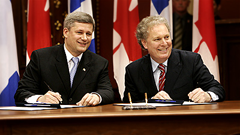
"That is Harper's personal and political challenge: To move the country gradually and incrementally in a conservative direction, building a wider coalition around a moderate conservative consensus."
-- Tom Flanagan, fall 2006
"If the Yes does not get 65 per cent, it does not win and separation is gone, never to return. Likewise, if the No fails to get 65 per cent, it, too, will have lost and the status quo is likewise gone forever. Anything between those two figures surely means that Mario Dumont's party has won and a special status for Quebec and the French language must be instituted."
-- Letter to the Editor, Montreal Gazette, just prior to the 1995 Quebec Referendum
Today The Tyee launches a week of special coverage of the federal budget and the Quebec election. In addition to features such as Laura Drake's analysis of B.C.'s stake in the equalization game and Will McMartin's eye-opener on 20 years of shrinking federal services, we'll be re-firing Election Central, our omnibus political blog. Today on the blog you'll find live budget blogging from Bryan Zandberg and Andy Prest in Vancouver, plus Laura Drake in Ottawa. The blogging continues all week, as we build towards next Monday's provincial election in La Belle Province: expect our regular mix of news aggregation, lively reporting and opinions and, beginning Thursday, my live reports from the campaign trail in Quebec.
Budgets happen every year. Provincial elections are no less scarce. So why are we throwing our resources into covering these two events?
Lifeline for Charest
Well, for one, it's the interplay between the two. Rarely, if ever, has a provincial premier bet so much on federal money. With his polling numbers mired in the low thirties (much of that heavily concentrated on the island of Montreal), Jean Charest is in serious danger of becoming the first Quebec premier in more than 30 years not to win a second term. After four years of unpopular (and mostly failed) attempts to reform Quebec's economy and public sector, Charest is relying heavily on billions in new transfers from Ottawa to prove he can bring home the bacon. If the promised ducats are judged wanting, voters could turf their Progressive Conservative cum Liberal leader. For who, though, is another question.
Harper's third solitude
Stephen Harper too, has a lot at stake, both in the budget and the election. For more than 10 years Harper has worked to re-create a new version of the Conservative coalition that shattered in 1993. This is no secret. Since at least 1996, Harper has preached the gospel that to win in Canada three unique band of conservatives: Western populists, traditional Tories and francophone nationalists, must merge. Harper got himself halfway there by fusing the Canadian Alliance the Progressive Conservative parties in 2004. But after two elections without the third member of the team, he is still well short of a majority government.
Tom Flanagan, Harper's longtime advisor and former chief of staff, wrote last year in an article for the policy journal Inroads that "[i]t is hard to imagine a Conservative majority government until the third sister is fully brought home, with at least 20 or 30 Conservative seats in Quebec." Harper took one step towards achieving that goal by recognizing the unique status of the Quebec "nation" in late 2006. But the major real test will be the reaction to today's budget. Harper's finance minister promised that it will address the "fiscal imbalance" -- the gap, real or perceived, between the tax and spending powers of the provincial and federal governments. If the effort is found wanting, Harper, like Charest, may find himself out chances.
In a way, though, those two narratives are sideshows to another, one that might have a permanent effect on the Canadian state.
A 'quiet devolution'
I mentioned above that if Charest loses, no one knows who will beat him. This election is not just between the Charest Liberals and the separatist Parti Quebecois. Mario Dumont, a fiscally conservative federalism fence-sitter and leader of the Action Democratique du Quebec (ADQ) is also a player. And, though notoriously vague in language, (right now he describes himself as an "autonomist") Dumont has had a consistent vision for Quebec's place within Canada: a new relationship, short of sovereignty, that sees the federal government devolve powers and taxation to the provincial level.
It is a vision that dovetails nicely with Harper's. Harper's goal, above and beyond winning a majority government, is as Flanagan wrote, to "move the country gradually and incrementally in a conservative direction." Undoubtedly that includes shrinking the size and role of the federal government. So if Dumont wins, or even wins the balance of power in a minority government, Harper may find just the right provincial partner to achieve his aims. But while Dumont concerns himself only with Quebec, Harper is unlikely to stop at one province. A quiet devolution of federal powers, to tax and to legislate, could creep from Newfoundland to B.C.
So why are we devoting more than our usual resources to this week in Canadian politics? Because today's budget and next week's vote may see not only the triumph or failure of Harper consensus in Canadian conservatism, but also a turning point in the Canadian federation.
Stay tuned.
Related Tyee stories:
- Now Quebec's a Nation?
- Harper's Appeasing of Quebec
- Harper's Aussie Advisor
- Has Harper Really Evolved?














Tyee Commenting Guidelines
Comments that violate guidelines risk being deleted, and violations may result in a temporary or permanent user ban. Maintain the spirit of good conversation to stay in the discussion.
*Please note The Tyee is not a forum for spreading misinformation about COVID-19, denying its existence or minimizing its risk to public health.
Do:
Do not: